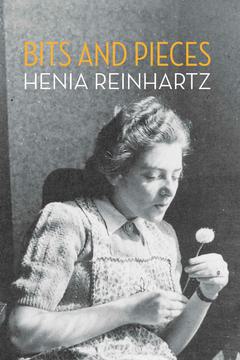Bits and Pieces
The War
My first encounter with Nazi cruelty came very soon. I was standing near the window of our apartment watching my father cross the street to get to a store to change some money. To my horror, I saw two German soldiers approach him, push him and order him to walk in front of them. I immediately ran out and begged the soldiers to let him go. I pleaded with them, telling them that he was my daddy and that they could not do this to him. They laughed, pushed me away, collected a few more Jewish men and marched them off toward the city centre. I marched beside them, together with my mother and some other Jewish women. The men were forced to dig trenches in the middle of the city until late that night. When my father was released, we ran home through the empty streets. My sister, Chava, was waiting for us with a hot meal. From that moment on, my father never left the apartment. We were constantly on the lookout and when we would see German soldiers rounding up Jewish men and dragging them from their homes, we would run home and lock my father in the apartment. They never took my father again.
On the ground floor of our house was a bakery owned by an elderly German couple. During the first days of the war, they would sell loaves of bread to their neighbours. They did it before opening the store, so that neighbours would not have to queue up a whole night in order to get bread. This helped us a lot. We would buy four loaves of bread and could exchange some for eggs and butter. Food was already scarce, and what was available was quite expensive. Even before the war began, people were discussing food shortages.
My father told us that he had taken our winter shoes to the shoemaker to make hiding places in the shoes’ heels for money and for my mother’s golden watch, her only valuable piece of jewellery. He wanted each of us to have some money in case we were separated. I do not know how much money we had, but I am sure it was not a lot. Nor did we know how long the war would last.
After a while our German neighbours stopped being generous to their Jewish neighbours and we had to line up like everyone else. The store opened in the morning, but people began to line up the evening before. One evening, we went down to join the line. My father stayed behind, locked in the apartment. I stood behind my mother, with my sister, Chava, behind me. Early the next morning, the doors opened and the line advanced in a slow but orderly fashion. I was not far from the door when suddenly a German soldier appeared with a little Polish boy not more than five or six years old. The little boy pointed at me, telling the soldier, “Jude! Jude!” (Jew! Jew!) The soldier kicked me out of the line. I ran home and said nothing to my father. I threw myself on the bed, tears streaming from my eyes. I could not stop crying. My world was collapsing and nothing was the same anymore. I was bewildered and could not understand what had just happened. I was humiliated and angry. I could not control my rage. My mother came up and tried to console me. “Don’t cry. You see, I have two loaves. I took one and hid it under my shawl and then went to the other salesman and got another one, for you. Don’t cry.” The finger of that little Polish boy pointing at me, telling the German soldier that I was a Jew, pierced my twelve-year-old heart. To this day, I still feel this hurt.
Bits and Pieces, Henia Reinhartz
Lodz, Poland, 1944. Teenaged Henia Rosenfarb sits with her family in a small, secret room, hiding from the Nazi soldiers who are looking for them. Little can the fiery redhead imagine the path her life would take, from wartime Poland to contemporary Canada. Hoping to elude the net that tightens around her as World War II advances, Henia makes two promises to herself: the first is that she will one day travel to Paris, and the second, that she will become a teacher. Supported by her family and by her commitment to the Bund, a political movement dedicated to social justice, Henia keeps her focus on those promises. These “bits and pieces” of her life give us a glimpse of a tumultuous past and a faith in the future.
Introduction by Sara Horowitz
- At a Glance
- Poland
- Lodz ghetto
- Auschwitz-Birkenau death camp
- Bergen-Belsen concentration camp
- Arrived in Canada in 1951
- Recommended Ages
- 14+
112 pages, including index
2008 Independent Publisher Gold Medal
2008 Canadian Jewish Book Award
About the author

Born in Lodz, Poland, Henia Reinhartz (1926–2021) endured the Lodz ghetto and survived Auschwitz and Bergen-Belsen. After the war, she moved to Paris, where she graduated as a Yiddish and Hebrew teacher and met her husband. Henia immigrated to Canada in 1951.
Free Books and Educational Materials
We help teachers bring the subject of the Holocaust into their classrooms, using first-person narratives as a way for students to connect with the history of the Holocaust through survivors’ experiences. Our Holocaust survivor memoirs, educational resources and programming are free of charge in Canada and available in both French and English.


